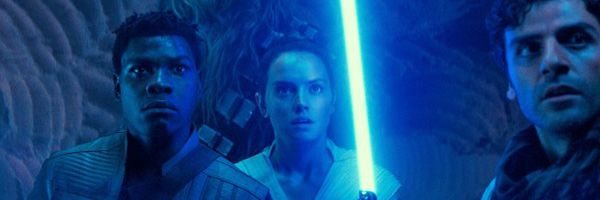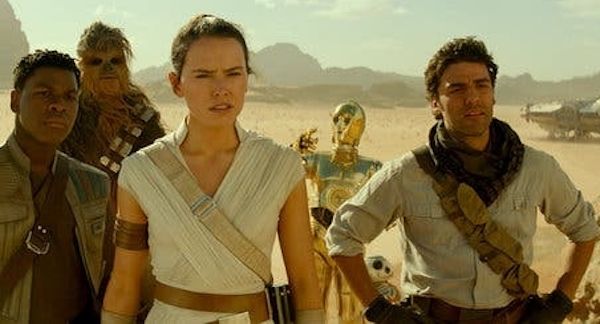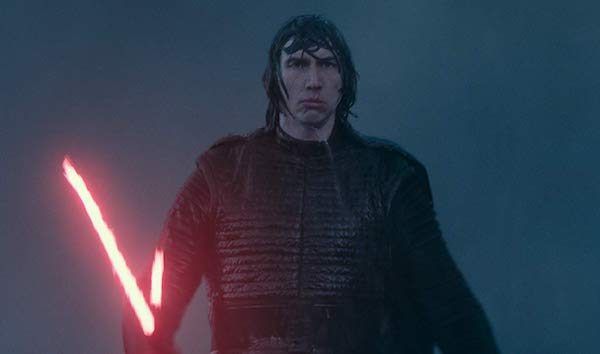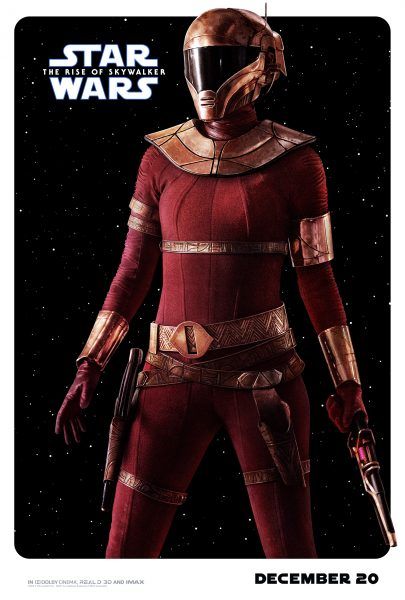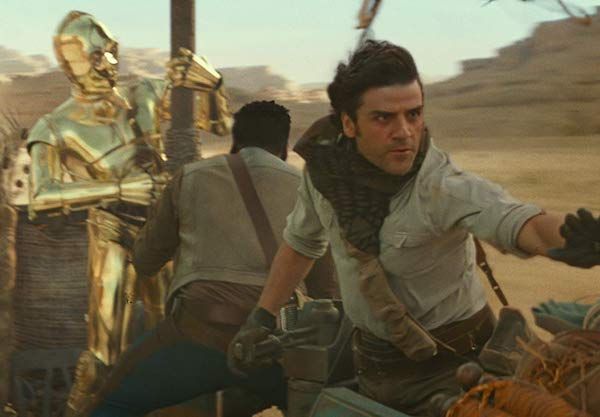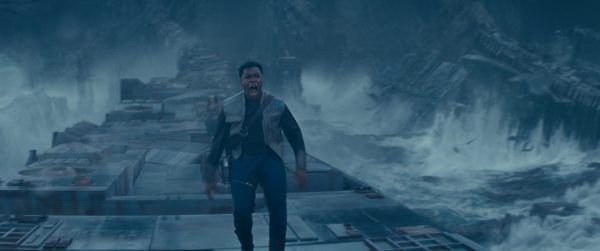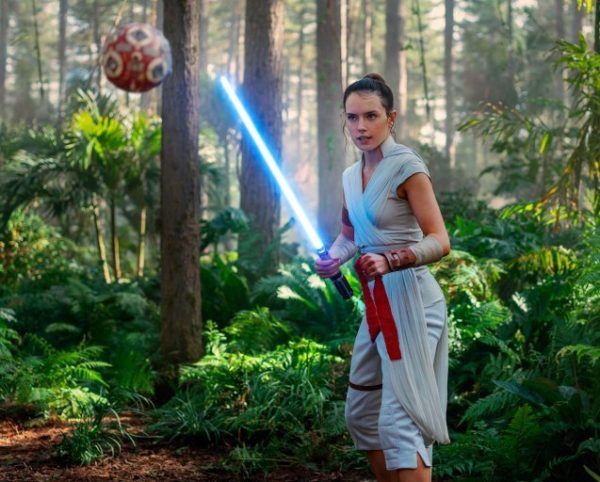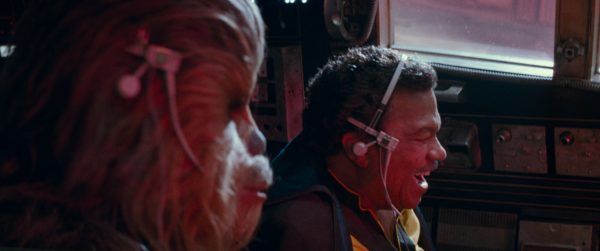From Lucasfilm, director J.J. Abrams and writer Chris Terrio, the conclusion of the Skywalker saga, Star Wars: The Rise of Skywalker, is sure to be an epic journey where new legends will be born, as the final battle for freedom is fought. The film stars Mark Hamill, Carrie Fisher, Billy Dee Williams, Daisy Ridley, John Boyega, Oscar Isaac, Adam Driver, Kelly Marie Tran, Domhnall Gleeson, Anthony Daniels, Lupita Nyong’o, Joonas Suotamo, Keri Russell, Richard E. Grant and Naomi Ackie.
During a conference at the film’s Los Angeles press day, held before anyone other than the cast had seen the film (so there are no spoilers), co-stars Daisy Ridley, John Boyega, Oscar Isaac, Adam Driver, and Keri Russell, along with writer/director J.J. Abrams and producer Kathleen Kennedy, talked about the first day working on The Force Awakens vs. The Rise of Skywalker, what they knew they wanted to do with this film, playing a masked character like Zorii Bliss, the changes in Poe Dameron, the Finn-Poe dynamic, how Kylo Ren and Ben Solo are intertwined, the process of including the late Carrie Fisher in the story, making a film that’s ultimately about hope, and being a part of the legacy that is Star Wars.
Question: J.J., you’re the only other person to take on this franchise twice, aside from George Lucas. What was the difference between your first day working on The Force Awakens and your first day working on The Rise of Skywalker? What happened in the time between?
J.J. ABRAMS: The difference is that the pressure shifted. We didn’t know, at the beginning of The Force Awakens, exactly what it would look like. With Daisy Ridley, Adam Driver, Oscar Issac and John Boyega, we didn’t know what that cast would be like, and we had to figure it out and discover it. On the first day of The Rise of Skywalker, we knew those things were work. What we didn’t know was everything else. And this was wrapping up, not one film or three films, but nine, so the responsibility was significant. This is a pretty big picture. The scale of the movie is pretty enormous. But we knew that none of that would matter and none of it would work, if you didn’t care deeply and track with the people. So, we knew we had this incredible cast, who have gone above and beyond anyone’s expectations, and are truly spectacular in the film.
This is a big blockbuster, but the performances are just so nuanced, so beautiful, and so deeply felt. There’s no comic book to follow, with this story, and no blueprint for this. When you thought about wrapping up nine films with this film, as a longtime fan, what was your personal process to get there? Did ideas start to come immediately?
ABRAMS: Because we had worked on The Force Awakens, (writer) Larry Kasdan and I, and (producers) Michelle Rejwan and Kathy Kennedy, had talked about quite a few things, back in the day, so it was a bit of picking up where we had left off. The fact is that what Rian Johnson had done in The Last Jedi had set up some things that were wonderful for the story, one of those things being that the cast was separated. The characters weren’t together for the entire movie, essentially. So, this was the first time that the group got to be together. Chris and I got together and we knew immediately that we wanted to tell the story of a group adventure. There were some very specific things that we were both drawn to immediately, and we just started doing the thing that you do, which is to say, what do you desperately want to see? What feels right? And then, my job, as the director, was to make sure that all the pressures of all the obvious things, like fan expectations and studio, and all of those practical, logistical issues, weren’t brought to set, and that on the set, we could have a buoyancy and a sense of being spry. We needed to keep the thing feeling as human as possible, and not like a massive machine.
Kathleen, you started as a camera operator for Monday Night Football. What did you learn from those days on the field, back in the ‘70s, that helped you in making these Star Wars films?
KATHLEEN KENNEDY: I learned that there is never a job too small. When you’re doing that kind of work, you get involved in every single thing that’s needed. That’s why, even when I’m standing on the set now, if I see a cable that’s crimped and I think somebody might trip, it’s very instinctual to me to start dressing the cables. It’s just a part of me. That was very much something that was instilled, when I did that job. In addition to operating camera, I did what’s called a parabolic microphone. You’re the only person, along with the photographer, that could be right on the sideline, and your job is to pick up the noise on the bench, but you also need to be watching the play on the field. I used to sit and watch football with my dad on weekends, all the time, so I knew the game pretty well, and I saw the pass play starting to materialize. So, when you do this job, if it’s going to be a pass play, you need to start running. I’ve got these cables on me, I’ve got this huge dish, and I’m running down the sideline, watching the pass. What I don’t see is a Minnesota Viking linebacker, who is running full speed toward me, and takes me out at the ankles. I’m flying through the air, and by some miracle, I didn’t get killed. I ended up on national television. That was my moment.
Why was J.J. Abrams your guy?
KENNEDY: I actually met J.J., along with a filmmaker by the name of Matt Reeves, when they were 15 and they had won a contest for movies they had made. I said to Steven Spielberg, “Why don’t we hire these two young guys to come in and take your home movies and clean them up, and give them a break and see if we can’t give them a start in the business?” Needless to say, for years, Steven and I watched J.J. and his career just take off, from that point. And when George Lucas asked me to step in and take over Lucasfilm, what I didn’t know was that the company would be sold, only months later. When it was sold, there was an edict, so to speak, that we needed to make a movie in a fairly short amount of time. The one thing I know about Star Wars and the one thing I know about these kinds of tentpole movies is this unique combination of needing dramatic storytelling, gravitas, and a great sense of humor, and there are few filmmakers that really embody both of those things and also have the capability to really manage something this huge. J.J. was my first choice, so that was an easy one.
Keri, you play Zorii Bliss, who’s a bad-ass, from the moment that you see her. How did you approach her? Did the anonymity of being masked add something new for you to play with, as an actor?
KERI RUSSELL: Definitely. J.J. called or emailed me and said, “Do you wanna be in Star Wars?” And I was like, “Yeah!” And then, he told me about the idea with the mask, and personally, I love the mask. That’s my fantasy dream sequence, that I can see everyone in the super tough version of myself, in costume, and no one can see me. That’s my dream. It’s a real power play, in a way, because no one can see what you’re really thinking, but you can see everyone else. It was amazing. I’ve known J.J. for so long, and I feel like we have a shorthand and we speak the same language, and I feel like J.J. got to finish a piece of history, by getting to do this, and he did such a great job.
ABRAMS: Keri loved the mask so much that, for the first two days that she worked as Zorii, the entire two days, I never saw her face. She could have, like most people, taken the mask off, in between takes, or after a couple hours, or after the whole day, but she walked onto set, with the mask on and was like, “Hey.” I was like, “Hey, you want to take that off?” She was like, “Nope.” And she had it on, the entire time. And then, the next day, it was the same thing. I got to work with Keri for a couple days and never saw her. It was very strange.
RUSSELL: He would be talking to me and say, “Can you take that off? It’s freaking me out.”
ABRAMS: It’s weird because you’re looking at it and you just don’t know.
RUSSELL: I know, and it was awesome.
Oscar, Poe feels different in this film. He’s really owning the swashbuckling thing.
OSCAR ISAAC: It’s the pants and the knee-high boots.
Did he feel different to you, this time around?
ISAAC: Yeah. He’s always been a bit of a wild card energy, in figuring out where he fits in the story and what story is being told. With this one, J.J. and I talked a bit, and he was excited about dirtying up the squeaky clean flyboy image that he’s had for a bit and just revealing more of his personality. That really comes out because he’s been taken away from his little box in space and he gets to join his friends this time. You really get to see the interaction with the three, and the hope that he, in particular, brings in this one. There’s a relentless, almost aggressive optimism that he has, and you’ll see how that’s tested, how he tries to be there for his friends, and how he tries to push them along, even when it seems quite hopeless. Also, the way that we approached shooting a lot of these scenes, there was a looseness to it. There were things shot in big, beautiful choreographed takes, that are just astounding to watch, where you’ll follow one character walking through this maze of an amazing planet, with all these Stormtroopers and aliens, and you realize it’s all this one amazing continuous take, with us talking over each other. It was that trust that J.J. allowed that gave it a real spark of vitality.
John, can you speak about the Finn-Poe relationship. Was that there, from day one?
JOHN BOYEGA: Yeah. When Oscar first came in, the chemistry was blatant, and there was a natural vibe between me and Oscar. I don’t even know why. I just liked the guy.
ISAAC: It was so sweet, he walked into my dressing room and was like, “Do you wanna run the scene before?” And I was like, “Yeah!”
BOYEGA: It was good chemistry. I felt most comfortable, while auditioning, doing the scenes where Poe was involved. love that element, and I was glad that we could find that, in our relationship.
How are you and Finn different?
BOYEGA: I like loyalty. Loyalty is something that I find very, very important, in my personal life. It’s just super-important to be loyal, and to understand the way in which people want to be loved and communicated with. It’s proactive love, and that’s something that Finn does, on a day-to-day basis. Throughout the film, a lot of the time, Rey is going off on this really hard journey, as a character blessed with so much power, and Finn tries to support her, in that journey, which is sometimes hard. In my real life, if I’ve tried to get in contact with you three or four times, and you’re going off, then I’m gonna leave you alone, but Finn is gonna come for you and try to make it work, regardless. I’m not built like that. In general, I think I’m a nice guy, but that consistency of niceness from Finn has given me questions, in my head, over the years.
Adam, in your performance of Kylo Ren, did you allow Ben Solo and who he was before to influence the way that you play Kylo, or is it a completely different space? Did you bring his legacy and heritage into the performance with you, for this film?
ADAM DRIVER: I think maybe subconsciously. When people are actively trying to deny a certain part of their lives, they can do it, pretty successfully. And then, it just turns into what is happening around them, that brings it out in them. I don’t think it’s something that we actively talked about playing. I think that’s a testament to the writing. From the beginning, it being called The Force Awakens was intentional, in that it was the Force awakening for both sides, the light and the dark. Even in those first meetings, J.J. talked about someone who is unformed and not quintessentially in control of his faculties and where he fits in, which is helpful for me, as an actor, because we are figuring out the same thing. It totally echoes what’s going on in the story, especially in the first one. As part of the new cast, it’s about figuring out where you fit, in a legacy that spans so much time. That was helpful.
Daisy, what was the scene that presented you with the greatest and most rigorous demand, either physically or emotionally?
DAISY RIDLEY: It’s a good question. With the physical stuff, you train and train and train, and then the adrenaline helps you, on the day, to do the thing. But obviously, the stamina needs to be there, for you to continue to do the thing. I would say that I was more tired emotionally because there really wasn’t a day where I was like, “No, it’s just a quick scene.” Coming from the last one, which was quite heavy, even the joyous scenes, I found very strange to do. And then, there was a lot of other stuff going on. It’s also tricky because understanding what J.J. was asking of me, I’d be like “I know what you’re asking, but I just can’t quite get there yet.” That was probably the most tricky thing, and sustaining that emotion. That singular intention was tiring. Even in the emotional scenes, there’s a physical containment that is tiring. So, both things were hard.
What was it about the joyous scenes that created such an obstacle for you?
RIDLEY: It’s just so strange. I’ve gone from a film with a lot of being like, “Please be my friend, Luke.” And he’s like, “Go away.” And I’m like, “No, please.” And then, there was very emotional stuff with Adam [Driver]. Coming back was great, and it would be so easy to just flow into it, in such a joyous way, that you feel like you’re having a chat with your pals, but it was strange, wondering how that general vibe is going to translate into a scene.
How would J.J. let you know whether it was working or not?
RIDLEY: I could tell when it wasn’t working because I’d look over and J.J. would [have this look on his face]. And then, there would be some seconds and I’d be like, “Go on,” and he’d come over and tell me what wasn’t working. I felt when it was working because you’re just feeling the thing.
It was really important to George Lucas that these films not be just popcorn films, but that there also is some universal truth to them. J.J., what does this film mean, and what do you want to say with it?
ABRAMS: That’s a terrific question. I like to think that when you’re working on something, especially something like this, and I say that as if these kinds of things come along all the time, and they never do, and I’m still grateful to that call from Kathy, but the truth is that there’s the movie that you know you’re presenting to the world, and then there’s the thing that you’re doing not necessarily secretly, but meaningfully. We live in a crazy world. We live in a crazy time. Star Wars, for me, is about hope, community, the underdog, and about bringing people together and seeing all of the odd balls represented, in the most unlikely of places. The family that you make is really your family. To tell a story that is, of course, a giant spectacle that’s in blockbuster wrapping, but where the thing that mattered to me most, more than all of the spectacular and unbelievable work that ILM has done, along with all of the departments going beyond expectations, is really the people that you’re watching, and the eyes and hearts of the characters. So, for me, rather than give away themes that Chris and I talked about doing, from the beginning, and what our specifics are, I will say that it really is about hope, and about coming back to a sense of possibility and unity. If Star Wars can’t do that for us, I don’t know what can.
What was it like, when you guys realized that the script for the final film in this saga was finished?
ABRAMS: When I called Chris [Terrio] to ask if he would be willing to do this, he screamed because he’s such a Star Wars fan, which I had been told. I was such a fan of Chris’ and had read a number of his screenplays. I thought Argo was just so beautifully written. I needed to have someone writing this with me, who would, from the very beginning, remind me of how much Star Wars meant, who hadn’t been inside of it before, the way I had. And I said to Chris, at the very beginning, “If you do this, you’re gonna be with me the whole time, to the very end.” And Chris, being the humble man that he is, made some self-deprecating joke about how I won’t want him around. We were together throughout production and throughout post, in the trenches with Michelle and Kathy, kicking every tire, shaking every tree, and doing everything that we could, to make sure that we were telling the best possible story we could. I cannot tell you how grateful I am for his partnership on this movie.
Can you talk about the process of integrating Carrie Fisher into the film and how you worked her into the story with the footage that you had found from The Force Awakens?
ABRAMS: Everyone who knew her, loved Carrie. I knew her for a long time. Not very well, but I knew her for awhile before The Force Awakens. We’d discussed the idea of continuing this story without Leia, but that was an impossibility, and there was no way we were going to do a digital Leia or ever recast it. But, we also couldn’t do it without her. And when we went back to look at the scenes that we hadn’t used in The Force Awakens, what we realized was that we had an opportunity. We could use that footage and use the lines that she was saying, and that was amazing. We knew that we had an opportunity to use the footage to create scenes that Leia would be in. Had Carrie been around, and it’s still impossible for me to believe that she isn’t because we’ve been editing with her, for about a year, and she’s been very much alive with us, in every scene, would we have done some different things, here and there? Of course, we would have. But we had an opportunity to have Carrie in the movie, and working with all the actors, including Billie Lourd, her daughter. We were able to do something that I’d like to think Carrie, herself, would be happy with. She’s great in the movie, of course. It’s still emotional and moving to think of her, and how sad we all are that she’s not with us today.
John, how does it feel to go from a film like Attack the Block to having a global audience with the Star Wars universe?
BOYEGA: I don’t know. I’m not the only one in it, so it’s cool to be able to share the load. I’ve been on this journey with Daisy [Ridley], more than anyone else, just in terms of circumstance and understanding of culture. There’s 100% understanding of our background and where we’re from. While we were auditioning, I had more money than Daisy. She had 17 pound 55 in her account, so she was definitely going over the transaction limit. We were just able to relate on that level. Most of the time, actors have this mystery about the personal things, but we stripped that bare. Having that connection, more than anything, I know that, if I feel any type of way, or if I experience something that’s weird, or if I’m at the store and I see something, I always just message Daisy because I know that’s somebody that would 100% relate. That has been my way of experiencing the whole thing. It has definitely been a huge life change, for all of us, and that, in itself, is exciting. I will say that I really do genuinely respect J.J. because he’s not into bullshit. When you come into this industry, the way that I did and that Daisy did, you get a whole bunch of promises and a whole bunch of people telling you that this is gonna happen, or that’s gonna happen. J.J. was like, “We’re gonna get you in for something, man.” I remember, he was coming out of the editing room with Tom Cruise, and I didn’t really know who J.J. was, to be honest. I was like, “That’s Tom Cruise, right there.” But I remember him saying, “I really liked you in Attack the Block. We’re gonna get you in something.” In my head, I was thinking, “I’ll see you in 20 years, mate!” But I went to audition at Bad Robot several times, before Star Wars, for the TV shows he was doing and other stuff. It just happened that Star Wars was what I was right for. So, I just appreciate that he wasn’t like the rest of this industry, talking shit half the time. He gets it done, and I respect him for that.
Daisy, being a part of the Star Wars universe offers great opportunity for change and to be a force for good. What do you want your legacy in the Star Wars community to be?
RIDLEY: Oh, my god, that’s deep. A lot of people in cinema are talking about representation and change, and aren’t doing it. Being part of a team of people that look a little different and that are from different places, in whatever form in that is – gender, race, or whatever – is a legacy, itself, to be proud of. Like J.J. said, this is a film of hope, and we are reflective of the world, at large. There are a lot of people up against magnificent forces, that are fighting the good fight. The characters aren’t real, but what they’re doing in cinema is perilous. So, to be able to portray even a tiny part of that, in this crazy world, is very special.
Star Wars: The Rise of Skywalker is in theaters on December 20th.

